August 23, 2014
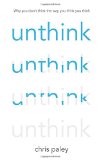
Unthink: And How to Harness the Power of Your Unconscious by Chris Paley (Coronet Books, 2014)
(kindle ed.), (amazon.co.uk), (UK kindle ed.)
Book description from the publisher:
Your life is dominated by your unconscious mind: by thoughts you’re unaware of and movements you don’t realise you are making. Words, colours, mannerisms and other cues you don’t realise are affecting you, change what you think. The confidence you have in your ability to reason and to consciously choose what to do is caused by a series of illusions that scientists are only just beginning to understand. The discovery of these illusions will change the way we see ourselves more than the discoveries of Darwin and Copernicus. Unthink explores the unconscious decisions we make, and covers a variety of topics, ranging from how we choose politicians and romantic partners to more abstract subjects such as whether we can consciously decide to move our fingers. The counter-intuitive observations that Chris makes in the book include: * If you want someone to fancy you, wear red and meet them somewhere frightening. * When waitresses repeat customers’ orders back to them instead of just saying ‘yes’ they receive bigger tips. * To reduce your shopping bill, start at the beer and snacks end of the store and work backwards. * If you sit someone in an upright chair when you give them good news they will be prouder of their achievements. * Having a picture of your family on your desk might make you work harder, but you’ll be rattier when you get home! Chris Paley shows us how we can understand ourselves and others better, by having a greater understanding of the way that the unconscious mind has an impact of the way we live our lives.
See also: Author’s website
Comments (0)
- new books,psychology,Uncategorized
August 19, 2014
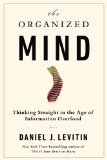
The Organized Mind: Thinking Straight in the Age of Information Overload by Daniel J. Levitin (Dutton, 2014)
(kindle ed.), (amazon.co.uk), (UK kindle ed.)
Book description from the publisher:
New York Times bestselling author and neuroscientist Daniel J. Levitin shifts his keen insights from your brain on music to your brain in a sea of details.
The information age is drowning us with an unprecedented deluge of data. At the same time, we’re expected to make more—and faster—decisions about our lives than ever before. No wonder, then, that the average American reports frequently losing car keys or reading glasses, missing appointments, and feeling worn out by the effort required just to keep up.
But somehow some people become quite accomplished at managing information flow. In The Organized Mind, Daniel J. Levitin, PhD, uses the latest brain science to demonstrate how those people excel—and how readers can use their methods to regain a sense of mastery over the way they organize their homes, workplaces, and time.
With lively, entertaining chapters on everything from the kitchen junk drawer to health care to executive office workflow, Levitin reveals how new research into the cognitive neuroscience of attention and memory can be applied to the challenges of our daily lives. This Is Your Brain on Music showed how to better play and appreciate music through an understanding of how the brain works. The Organized Mind shows how to navigate the churning flood of information in the twenty-first century with the same neuroscientific perspective.
Google Books preview:
See also:
Author’s website
Comments (0)
- new books,psychology
August 18, 2014
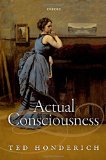
Actual Consciousness by Ted Honderich (Oxford University Press, 2014)
(amazon.co.uk)
Book description from the publisher:
What is it for you to be conscious? There is no agreement whatever in philosophy or science: it has remained a hard problem, a mystery. Is this partly or mainly owed to the existing theories not even having the same subject, not answering the same question? In Actual Consciousness, Ted Honderich sets out to supersede dualisms, objective physicalisms, abstract functionalism, general externalisms, and other positions in the debate. He argues that the theory of Actualism, right or wrong, is unprecedented, in nine ways. (1) It begins from gathered data and proceeds to an adequate initial clarification of consciousness in the primary ordinary sense. This consciousness is summed up as something’s being actual. (2) Like basic science, Actualism proceeds from this metaphorical or figurative beginning to what is wholly literal and explicit–constructed answers to the questions of what is actual and what it is for it to be actual. (3) In so doing, the theory respects the differences of consciousness within perception, consciousness that is thinking in a generic sense, and consciousness that is generic wanting. (4) What is actual with your perceptual consciousness is a subjective physical world out there, very likely a room, differently real from the objective physical world, that other division of the physical world. (5) What it is for the myriad subjective physical worlds to be actual is for them to be subjectively physical, which is exhaustively characterized. (6) What is actual with cognitive and affective consciousness is affirmed or valued representations. The representations being actual, which is essential to their nature, is their being differently subjectively physical from the subjective physical worlds. (7) Actualism, naturally enough when you think of it, but unlike any other existing general theory of consciousness, is thus externalist with perceptual consciousness but internalist with respect to cognitive and affective consciousness. (8) It satisfies rigorous criteria got from examination of the failures of the existing theories. In particular, it explains the role of subjectivity in thinking about consciousness, including a special subjectivity that is individuality. (9) Philosophers and scientists have regularly said that thinking about consciousness requires just giving up the old stuff and starting again. Actualism does this. Science is served by this main line philosophy, which is concentration on the logic of ordinary intelligence–clarity, consistency and validity, completeness, generality.
Google Books preview:
See also: Author’s website
Comments (0)
- consciousness,new books
August 13, 2014
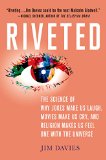
Riveted: The Science of Why Jokes Make Us Laugh, Movies Make Us Cry, and Religion Makes Us Feel One with the Universe by Jim Davies (Palgrave MacMillan, 2014)
(kindle ed.), (amazon.co.uk), (UK kindle ed.)
Book description from the publisher:
Why do some things pass under the radar of our attention, but other things capture our interest? Why do some religions catch on and others fade away? What makes a story, a movie, or a book riveting? Why do some people keep watching the news even though it makes them anxious?
The past 20 years have seen a remarkable flourishing of scientific research into exactly these kinds of questions. Professor Jim Davies’ fascinating and highly accessible book, Riveted, reveals the evolutionary underpinnings of why we find things compelling, from art to religion and from sports to superstition. Compelling things fit our minds like keys in the ignition, turning us on and keeping us running, and yet we are often unaware of what makes these “keys” fit. What we like and don’t like is almost always determined by subconscious forces, and when we try to consciously predict our own preferences we’re often wrong. In one study of speed dating, people were asked what kinds of partners they found attractive. When the results came back, the participants’ answers before the exercise had no correlation with who they actually found attractive in person! We are beginning to understand just how much the brain makes our decisions for us: we are rewarded with a rush of pleasure when we detect patterns, as the brain thinks we’ve discovered something significant; the mind urges us to linger on the news channel or rubberneck an accident in case it might pick up important survival information; it even pushes us to pick up People magazine in order to find out about changes in the social structure.
Drawing on work from philosophy, anthropology, religious studies, psychology, economics, computer science, and biology, Davies offers a comprehensive explanation to show that in spite of the differences between the many things that we find compelling, they have similar effects on our minds and brains.
Google Books preview:
See also: Author website
Comments (0)
- new books,psychology
August 12, 2014
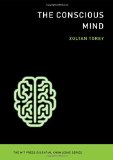
The Conscious Mind (MIT Press Essential Knowledge) by Zoltan Torey (MIT Press, 2014)
(kindle ed.), (amazon.co.uk), (UK kindle ed.)
Book description from the publisher:
How did the human mind emerge from the collection of neurons that makes up the brain? How did the brain acquire self-awareness, functional autonomy, language, and the ability to think, to understand itself and the world? In this volume in the Essential Knowledge series, Zoltan Torey offers an accessible and concise description of the evolutionary breakthrough that created the human mind. Drawing on insights from evolutionary biology, neuroscience, and linguistics, Torey reconstructs the sequence of events by which Homo erectus became Homo sapiens. He describes the augmented functioning that underpins the emergent mind — a new (“off-line”) internal response system with which the brain accesses itself and then forms a selection mechanism for mentally generated behavior options. This functional breakthrough, Torey argues, explains how the animal brain’s “awareness” became self-accessible and reflective — that is, how the human brain acquired a conscious mind. Consciousness, unlike animal awareness, is not a unitary phenomenon but a composite process. Torey’s account shows how protolanguage evolved into language, how a brain subsystem for the emergent mind was built, and why these developments are opaque to introspection. We experience the brain’s functional autonomy, he argues, as free will. Torey proposes that once life began, consciousness had to emerge — because consciousness is the informational source of the brain’s behavioral response. Consciousness, he argues, is not a newly acquired “quality,” “cosmic principle,” “circuitry arrangement,” or “epiphenomenon,” as others have argued, but an indispensable working component of the living system’s manner of functioning.
Comments (0)
- consciousness,new books







